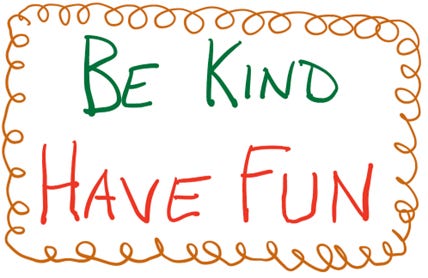Lunch with a Friend
Be Kind, Have Fun
Post 9: Lunch with a Friend
This post began as a story about a recent lunch with a friend – one that moved me to thinking even more deeply about institutional postures and the ways they influence our own approaches. But as I reflected, while I had tried to anonymize it, the closer I looked, the more I felt that it might be possible for someone to get hard feelings about it, for the details to be too identifiable. And that simply isn’t the tone and the mission of my writings here. My posture here is hopeful – stories that makes us think and feel about where we are going in our digital saturated world, with AI as the accelerant. I want to encourage people and build them up here.
A Motto and a Mission.
So, I scrapped the first part of the post, but I can’t get the rest of it out of my mind, so here’s the rest. There’s a tension in this one still. A healthy tension, leavened with respect for the institutions and mindsets involved.
I read this week the AAUP’s statement on AI in academic professions. The AAUP’s recent statement emphasized faculty autonomy, institutional safeguards, and resistance to surveillance. It warned against the corporatization of AI tools and called for preserving traditional modes of scholarship.
It left me scratching my head. I could agree with parts of it—I agree that we need to protect faculty from exploitative uses of AI. Surveillance, plagiarism detection, and algorithmic bias are real concerns. We need ethical guardrails.
But most of it left me cold. Three quick points of divergence:
Formation vs. Autonomy
The AAUP centers autonomy—as if the highest good is freedom from interference. But I don’t think that’s the business we are supposed to be in. My (Our?) highest calling is in the formation of young people, I’d dare to say, done well, the formation of souls. There sure isn’t a lot of room for that if all we’re worried about is one side of the coin. The question isn’t whether AI will form us, but how—and toward what end.
Fear vs. Stewardship
The AAUP treats AI as a threat to manage. I believe it’s a tool to steward. We need theological imagination, not just policy caution.
Preservation vs. Innovation
The AAUP wants to preserve the old ways. In some sense, there can be some good in this. But Christians are always called to navigate such moments with wisdom and grace—“wise as serpents and innocent as doves” (Matthew 10:16). We will need to meet this moment by keeping our compass fixed on the command of Christ: to love God and love our neighbor (Matthew 22:37–39). My view of technology is that it is simply a tool—we have to decide whether we’ll use it for good or ill, and blind preservation is not wisdom.
While I can’t share much of the lunch that inspired me to write this post, I can tell you about the place where I ate. I’ve had dozens of impactful conversations over the years there, and I wonder if one of the reasons I feel empowered to wrestle with hard things there is the large painted graphic on the wall. The motto at my favorite BBQ joint is simple —“Be Kind. Have Fun.”—and its more than a slogan. It’s a way of approaching things at my favorite lunch place. But for me, I hope it is more. It’s a vision for what higher ed could be, and should be. We need to be in the business of life transformation, one student at a time. And we need to do it with kindness, the biblical kind that means that rare blend of love and truth.
We need a new imagination for AI—not just as a threat, but as a redemptive opportunity. We need to ask not just what we’re protecting, but what we’re forming.
And we need to remember that kindness and joy are not luxuries. They’re signs of hope. They’re the fruit of a university that knows where it’s going.
Let’s finish here to contemplate:
What kind of people are we forming in our classrooms and our workplaces—and what kind of institutions are we helping them become?
Can we imagine a future where AI helps us be more human, not less—and where kindness and joy are signs of a deeper hope?



